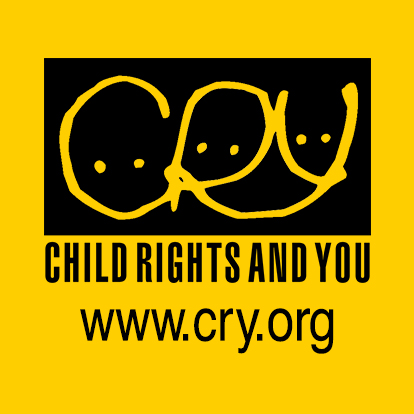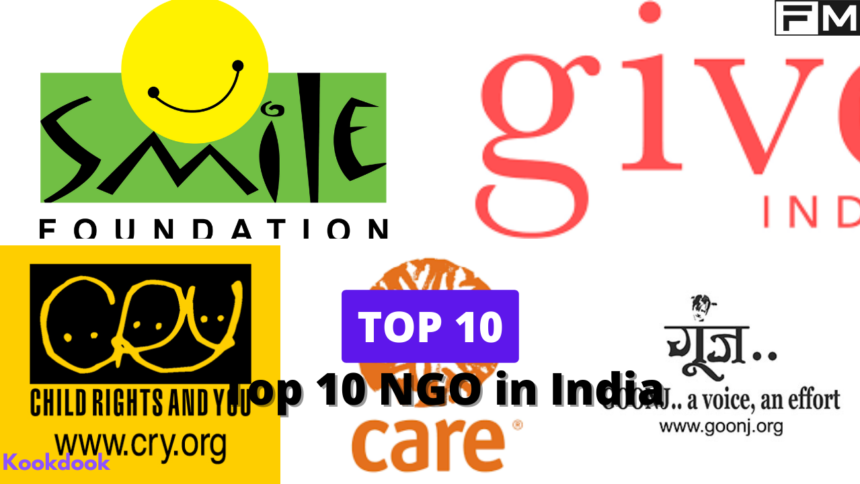The NGO operates independently from the government, meaning the government has no involvement. It is a Non-Governmental Organization and does not seek personal gain. NGOs strive to assist individuals in poverty with their unwavering dedication and remarkable efforts. Volunteers often establish NGOs at the local, national, and international levels to tackle issues related to public services and goods. Transparency and accountability are essential values upheld by this organization.
1. Child Rights and You (CRY)

CRY, short for Children’s Rights and You, is an NGO dedicated to restoring fundamental rights to disadvantaged children in India. The organization was founded in December 1978 by seven young individuals, led by Rippan Kapur, a carrier purser. Surprisingly, instead of establishing a grassroots-level organization solely focused on oppressed children, the founders chose to create a link between Indians with resources and dedicated fieldworkers. They saw their role as empowering influencers, fostering a sense of ownership and driving positive change for the most vulnerable members of society. CRY operates in a unique form of local community development, working towards the benefit of the weak and marginalized.
2. Smile Foundation

Smile Foundation is a non-profit and non-governmental organization based in India.The organization focuses on child education and women’s empowerment, primarily operating in disadvantaged areas. Their areas of work include education, well-being, vocational training, and community strengthening. The headquarters of Smile Foundation is located in New Delhi. Santanu Mishra serves as a fellow donor and the main legal administrator of the organization. It has positively impacted approximately 600,000 underprivileged children and families through over 400 government-supported projects. The organization focuses on promoting health, education, skill development, entrepreneurship, and women’s empowerment. Their work spans across 25 states in India, starting from around 2018.
3. Give India Foundation

The aim is to enhance effective and impactful initiatives that offer greater opportunities to India’s underprivileged population. In India, there exists a strong culture of giving, with individuals consistently contributing 2% of their earnings to support those in need. Give India strives to create an active charity marketplace, ensuring that the most capable and impactful charities have access to ample resources. The core belief of Give India is based on the concept of fairness and equal opportunities. The organization believes that every individual, regardless of their background or circumstances of birth, should have an equal chance to succeed in life. This belief serves as the foundation for all the work carried out by Give India.
4. Goonj
Goonj, based in New Delhi, India, is a non-governmental organization that focuses on disaster relief, compassionate leadership, and community development. The organization operates in 23 states across India, addressing the often overlooked requirement of clothing. Goonj was founded in 1999 by Anshu Gupta, with an initial contribution of 67 dresses. Anshu Gupta’s work with Goonj earned him the prestigious Ramon Magsaysay Grant in 2015. In 2012, he was recognized as India’s Social Business Person of the Year by Schwab Foundation, a sister group of World Economic Forum. Anshu Gupta established Goonj in 1999, and the organization now manages over 3500 tons of material annually. Goonj is registered under the Societies Act and is eligible for exemptions under Section 80G, 12A, and FCRA for foreign donations.
5. Care India
The ‘Indo-CARE Bilateral Agreement’ has been approved by both CARE and the Indian Parliament, marking the first collaboration of its kind. This agreement sets the foundation for CARE’s comprehensive aid programs in India. In a significant effort, around 20,000 tonnes of food were distributed nationwide, establishing the basis for CARE’s sustenance program. The organization introduced initiatives in disaster relief, sustenance, agriculture, healthcare, and education.In 2013, CARE India became an independent entity, joining the larger CARE Global Confederation. One of their notable initiatives is the Bihar Specialized Help Program, aimed at enhancing maternal, infant, and child well-being in the state.
6. Nanhi Kali
In 1996, Anand Mahindra, Executive of Mahindra Group, established the K.C. Mahindra Education Trust. The primary objective of the trust was to provide education to underprivileged young girls in India. The initiative was driven by concerns over population growth, low levels of female literacy, and limited participation of women in the workforce. Additionally, societal challenges like child marriage and child labor were prevalent, especially in rural areas of India. Anand Mahindra recognized the significant areas of improvement within the cultural landscape of India. He identified issues such as outdated customs, lack of opportunities for girls, hierarchical structures, and limited access to education. Educating young girls was seen as a solution that could not only contribute to economic progress but also lay the foundation for a more equitable society. The World Bank has repeatedly validated this approach, highlighting the economic costs of limited educational opportunities and barriers faced by young girls in completing 12 years of schooling.
7. HelpAge India
HelpAge India is a well-known nonprofit organization that was established under the Societies Registration Act of 1860. The organization was founded in 1978 with a focus on improving the well-being and care of vulnerable older individuals. HelpAge India envisions a world where older people can lead fulfilling lives with dignity and good health. In recognition of its exceptional work in elderly care, aid programs during the Covid-19 pandemic, and advocacy for the rights of older people in India, HelpAge India was recently honored with the ‘UN Population Award 2020’.
8. Pratham
Pratham, one of the largest non-governmental organizations in India, is dedicated to providing quality education to underprivileged children. The organization was co-founded by Madhav Chavan and Farida Lambay. Pratham operates in 23 states and union territories across India, with additional support sections in countries like the United States, United Kingdom, Germany, Sweden, and Australia. Madhav Chavan, the founder and former president of Pratham, was honored with the Skoll Award for Social Entrepreneurship in 2011. In 2013, Pratham also received the BBVA Foundation Frontiers of Knowledge Award for its impactful work.Through its efforts in addressing the educational needs of marginalized children for over two decades, Pratham has fostered collaborations and developed innovative approaches to accelerate learning. The organization implements a grassroots methodology that groups students based on their actual levels and needs, rather than their age.
9. Save the Children India
Save the Children India, also known as Bal Raksha Bharat, is a nonprofit organization dedicated to improving the lives of disadvantaged children. The organization was established in Gurugram, India, under the Societies Registration Act of 1861. Save the Children India is a part of the global Save the Children Coalition. Although Save the Children has been active in India since the 1940s, it was officially renamed Bal Raksha Bharat in April 2008. Since then, the organization has reached an impressive number of 10.1 million children. Save the Children India implements community-driven initiatives across India, ranging from remote villages to urban areas.
10. Oxfam India
Oxfam India is committed to ensuring a secure and violence-free life for marginalized communities like Adivasis, Dalits, Muslims, women, and young girls. The organization strives for equal opportunities for these communities to understand their rights and envision a future free from discrimination.Oxfam India focuses on exploring long-term solutions to address growing inequalities and to prevent underserved communities from facing barriers in accessing employment, quality education, and healthcare. The organization also advocates for policy changes and legislative improvements to create a more inclusive and equal society, in line with the vision outlined in the Indian Constitution. Oxfam India provides support and assistance to the poorest of the poor affected by disasters and humanitarian crises, working towards preserving, safeguarding, and transforming their lives.






